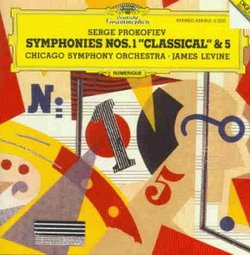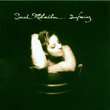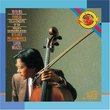| All Artists: Sergei Prokofiev, James Levine, Chicago Symphony Orchestra Title: Prokofiev: Symphony No. 1 in D Major, Op. 25 (Classical); Symphony No. 5 in B Flat Major, Op. 100 Members Wishing: 0 Total Copies: 0 Label: Deutsche Grammophon Release Date: 11/14/1995 Album Type: Import Genre: Classical Styles: Historical Periods, Modern, 20th, & 21st Century, Symphonies Number of Discs: 1 SwapaCD Credits: 1 UPC: 028943991223 |
Search - Sergei Prokofiev, James Levine, Chicago Symphony Orchestra :: Prokofiev: Symphony No. 1 in D Major, Op. 25 (Classical); Symphony No. 5 in B Flat Major, Op. 100
CD DetailsSimilarly Requested CDs
|
CD ReviewsExcellent Fifth! Shota Hanai | Torrance, CA | 06/21/2001 (4 out of 5 stars) "I believe that James Levine is what I catagorize as a "bold" conductor, because his performance is rather strongly heavily played whenever he plays with the orchestra, especially the Chicago Symphony. Similar reason with Karajan too. That's why I recommend you to buy Abbado's performance for Prokofiev's first symphony, rather than Levines. The first symphony is supposedly petite and delicate, and "twitchy". Abbado performs with clarity and his tempo is excellent; Levine plays a bit heavily, as well as Karajan. On the brighter side, Levine performs very well on the almighy fifth symphony, nicknamed "The Heroic". When I heard the music for the very first time, it was totally awesome! The first movement is my favorite. The brass is excellent, but the percussion players, I really want to thank, are the best! I am truly moved by the powerful blended sound of the crash cymbal and the tam-tam at the ending part of the movement. That just made me say "WOW! Titanic!" Just totally awesome, much better than Ashkenazy's, which tended on putting the purcussions a bit behind from the brass. If you never heard the music, I think you should try this CD out for Prokofiev's fifth symphony. If you're after the first, though, look for Abbado." Prokofiev Symphonies Brett A. Kniess | Madison, WI | 11/29/2005 (5 out of 5 stars) "On this disk is a nice representation of Sergei Prokofiev's symphonic works, ones which at first seem diametrically opposed, but which in the end, is clearly the voice of a modern master. The Classical Symphony, Prokofiev's first symphony, was not just an exercise in composition, but Prokofiev, who normally composed at the piano, wanted to try without. The end result is a surprisingly charming work, little expected from Prokofiev at the time. In all four movements, he writes charming, imaginative and memorable melodies of a "classical" structure, along with "classical" textures and articulations. The harmonies are "romantic" in nature, often taking unusual side trips to unexpected progressions. Not a terrible long work, the style is evocative of Stamitz's classical symphonies rather than Mozart or Haydn's, but the voice is clearly a modern one. The outer movements are whimsical and brash while the inner ones are a bit more on the courtly side. The Fifth Symphony is a much more aggressive work. Creating sounds we are used to from Prokofiev, he uses dissonance in accord with his great orchestrations and melodic writing. The 1st and 3rd movements are ones of great angst and the longest (both over 12 minutes). One wonders if Prokofiev were not constrained by the Stalin regime if his musical language would show such emotion. It is in the 2nd and last movements that Prokofiev's mastery of melody shines forth. The jumpy scherzo melody of the 2nd movement continues the gloom of the 1st, but sheds some humor (or perhaps folk elements) on the work. The almost sunny, but certainly expansive, melody of the 4th movement is given to the clarinet, giving the finale a more lighthearted feel after the great lyricism and gloom of the 3rd movement. A great symphony; both works on the disk are the heights of Prokofiev's symphonic writing. James Levine and the Chicago Symphony Orchestra have recorded together previously with great success. This disk is no let down. In the Classical Symphony, Levine follows all the articulation markings in the score giving Chicago a much different sound than in the latter work, one with great alacrity and lightness. The extroverted nature of the Fifth Symphony is perfect for Chicago to drive home. Levine brings home a winner, and the great pairing on one CD doesn't go unnoticed. If you can find it, you can't go wrong." Not quite there John Grabowski | USA | 06/30/2001 (3 out of 5 stars) "Some parts are very close. But this CD falls short ultimately. The "Classical" is the biggest misfire: Levine's concept is very romantic and heavy for a quicksilver work. Much of the clever economy of thought and charm of content are lost. But even the mighty 5th isn't quite right. Some of the tempi relationships are tenuous, and the first movement is just too FAST. Epic shapes are glossed over, climactic moments are missed, and the percussion, while impressive, isn't impressive *enough.* The third movement too is inexpliucably rushed--Andante rather than Adagio--and the big central climax never seems to arise organically from the material that preceeds it but rather just appears out of nowhere, almost sounding spliced in (in an aesthetic sense...technical it sounds fine). The finale is also a bit too fast for its own good--it feels as though the CSO is skating over the music and thus it feels disconnected from the other movements rather than a logical and inevitable build-up. Still there are some fine moments in this 5th: the scherzo is a gas, as is much of the finale (at least from a virtuoso standpoint). And some parts, leading into and out of the central section of the slow movement, work. The finest Prokofiev 5th I've ever heard is (believe it or not) Eugene Ormandy and the Philadelphia Orchestra, 1977, on RCA, unfortunately never released on CD. (This is not to be confused with the Sony recording, which is on disc...that recording is fair, but not great.) If RCA ever sees fit to put their recording on CD grab it, or if you collect used vinyl and come across it, do the same. Meanwhile this recording is fine. You wouldn't "go wrong" in buying it. But somehow with the caliber of forces at work, and the excellent reviews, I expected better."
|


 Track Listings (8) - Disc #1
Track Listings (8) - Disc #1
![The Ink Spots - The Greatest Hits [MCA]](https://nationalbookswap.com/cd//m/61/4061/24061.jpg)







